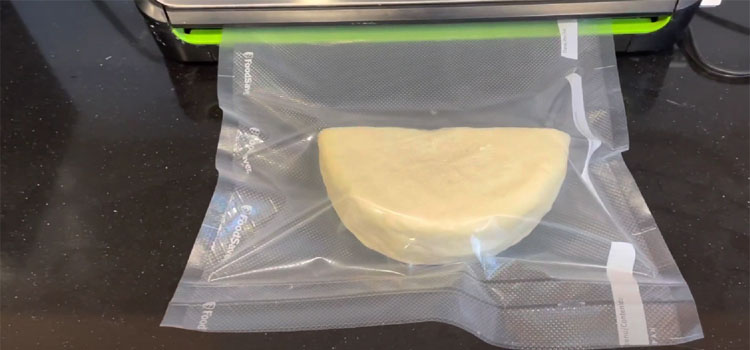Last Updated on September 15, 2024 by Shari Mason
My love for food began a thrilling adventure filled with curiosity. One day, a question stopped me in my tracks: **Does vacuum-sealed cheese need refrigeration?** Thinking about it made my mind race. Now, here’s a cool find—vacuum sealing **removes air**, which helps keep cheese fresh much longer, like **weeks** longer! But don’t pop that cheese in the pantry just yet. Most cheeses are happier and last even longer when they stay cool and cozy in the fridge. Imagine tasty cheeses whispering secrets of their best-keeping tricks!
So, really, does vacuum-sealed cheese need to be refrigerated?
Let’s find out.
Do You Need To Refrigerate Vacuum-Sealed Cheese?


Yes, it is advisable to refrigerate vacuum-sealed cheese [1]. While vacuum-sealed packaging protects against spoilage, refrigeration further extends the cheese’s freshness and shelf life.
“Age is something that doesn’t matter, unless you are a cheese.”
– Luis Bunuel, Spanish-Mexican Filmmaker
Cold temperatures help slow the aging process, preserving the cheese’s texture, flavor, and overall quality.
But will Parmesan cheese go bad if left out?
Can You Freeze Vacuum-Sealed Cheese?
Yes, you can freeze vacuum-sealed cheese. Freezing can help extend the shelf life of cheese, including vacuum-sealed varieties.
However, it’s important to note that freezing may affect the texture and consistency of the cheese.
Some types of cheese may become crumbly or grainy after freezing, but they can still be used in recipes that require melting, such as sauces or casseroles.
It is recommended to label the cheese with the date before freezing and consume it within a reasonable time frame for the best quality. Thaw frozen vacuum-sealed cheese in the refrigerator before using it.
But how long is unopened Gruyere cheese good for?
“Like a well-choreographed dance between flavor and preservation, refrigeration embraces vacuum-sealed cheese, keeping its creamy secrets intact, ensuring that each bite reveals a symphony of tastes that captivate the senses.”
– Eat Pallet Restaurant & Food Advice
Signs That Vacuum-Sealed Cheese Might Have Gone Bad
- Visible Mold: If you notice mold growth on the cheese, either on the surface or within the packaging, it clearly indicates spoilage. Mold can appear in various colors, such as blue, green, or white. Discard the cheese if you spot any mold, as it can produce harmful toxins.
- Off Odor: Pay attention to the smell of the cheese. It likely indicates spoilage if it emits an unusual or unpleasant odor, such as a sour or ammonia-like smell [2]. Fresh cheese should have a pleasant aroma, so a foul or rancid odor is a sign that it’s gone bad.
- Texture Changes: Examine the texture of the cheese. It suggests spoilage if it has become excessively dry, crumbly, or slimy. A healthy cheese should have a consistent texture and not exhibit any significant changes in its physical state.
- Discoloration: Notice any changes in the color of the cheese. While some cheeses may naturally develop a slightly yellowish or brownish tint over time, any abnormal discoloration, such as dark spots or an overall off-color appearance, could indicate spoilage.
- Taste Test: If unsure about the cheese’s condition, perform a small taste test. If the cheese tastes noticeably different from its usual flavor or has a sour or bitter taste, it has likely deteriorated and is no longer safe to consume.
Tips & Tricks On How To Store Vacuum-Sealed Cheese


- Refrigeration: Vacuum-sealed cheese should be stored between 34-38°F (1-3°C) in the refrigerator. The cold temperature helps slow down the aging process and prevents bacterial growth.
- Original Packaging: Keep the cheese in its original vacuum-sealed packaging as long as it remains intact and undamaged. The packaging is designed to provide an airtight seal, ensuring optimal freshness.
- Resealing: If the original packaging is opened but still in good condition, reseal it tightly after each use. Press out any excess air and ensure a tight seal to maintain the cheese’s freshness.
- Airtight Containers: If the original packaging is compromised, transfer the cheese to an airtight container or wrap it tightly in plastic wrap. This extra layer of protection helps prevent air exposure and maintains the cheese’s quality. But how long will shredded mozzarella cheese last in the fridge?
- Cheese Drawer or Fridge Section: Place the vacuum-sealed cheese in the cheese drawer, if your refrigerator has one, or in a designated section of the fridge. This helps isolate it from other strong-smelling foods, preventing flavor transfer.
- Labeling: If you remove the cheese from its original packaging, label it with the date to keep track of its shelf life. Different types of cheese have varying storage durations, so noting the date helps ensure timely consumption.
- Avoid Freezing: While vacuum-sealed cheese can be frozen, it may affect the texture and consistency. It is generally best to consume it within the recommended storage time frame rather than freezing it.
- Smell and Taste Test: Before using the cheese, perform a smell and taste test to ensure it has stayed good. If it has an off odor or taste, discard it to avoid potential health risks.
FAQs
u003cstrongu003eCan vacuum-sealed cheese be safely stored at room temperature?u003c/strongu003e
No, it is not recommended to store vacuum-sealed cheese at room temperature.
u003cstrongu003eAre there any exceptions to refrigerating vacuum-sealed cheese?u003c/strongu003e
Yes, some types of vacuum-sealed cheese, such as processed cheese slices, may be stable at room temperature due to their specific manufacturing process. u003cbru003eu003cbru003eHowever, refrigeration is still recommended for most vacuum-sealed cheeses like cheddar, Gouda, or Swiss.
In Conclusion
Refrigeration is generally recommended for vacuum-sealed cheese. While vacuum-sealed packaging protects against spoilage, refrigeration further extends the cheese’s freshness and shelf life.
Cold temperatures help slow the aging process, preserving the cheese’s texture, flavor, and overall quality.
However, it is essential to note that there may be exceptions for certain types of vacuum-sealed cheese, such as processed cheese slices.
Always check the label or consult the manufacturer’s instructions for specific storage recommendations.
References:
- https://www.medicalnewstoday.com/articles/299147
- https://www.medicalnewstoday.com/articles/sweat-smells-like-ammonia
- Can You Put an AC Unit in the Kitchen? - September 27, 2024
- What Cheese Does Olive Garden Use? Discover Their Signature - September 27, 2024
- How to Cancel a Pizza Hut Order? Quick & Easy Guide - September 24, 2024


